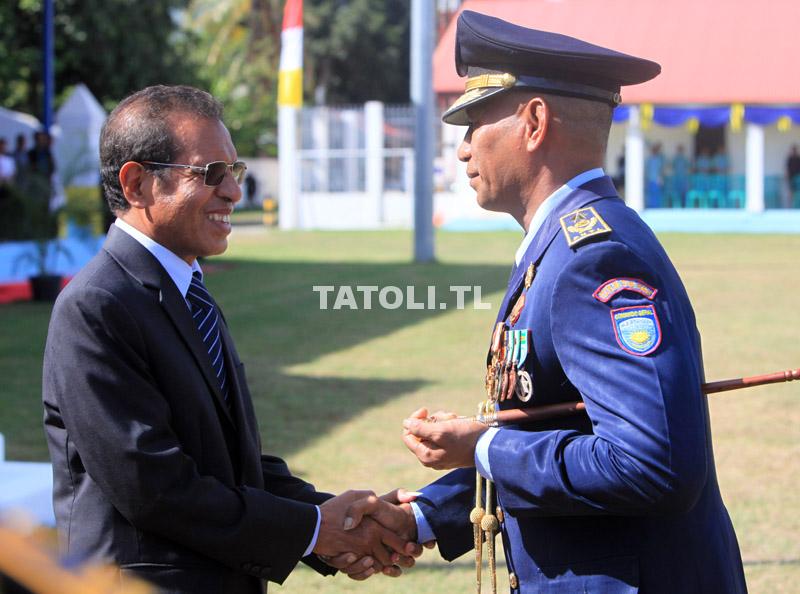
Photo: TATOLI. TL
As the end of the year approaches, Fundasaun Mahein (FM) looks back at the major challenges and lessons learned for PNTL in 2018. FM observes that many of PNTL’s problems stem from a common source: a lack of clear policy coming from the top and a failure to implement policies that do exist. FM encourages PNTL decision-makers to consider the ways their leadership resonates throughout the police force, and to make 2019 a year of proactive, top-down reform.
Unauthorized use of weapons.
Incidents this year in Kulu-Hun, in which an intoxicated police officer shot dead three young men, and Maliana, in which off-duty police and military exchanged gunfire at a music festival, highlight the problem of unauthorized firearm usage. In theory, members of PNTL must check their guns into the local armory when they finish their shifts. In practice, many fail to do so, leading to situations in which off-duty, ununiformed police officers use their guns to settle personal disputes – sometimes with tragic results.
In a blog last month, FM suggested a number of reforms that could help fix the problem of loose guns and prevent future violent incidents. First, PNTL should launch a review of its registration system to ensure that it is up to the task of recording all firearms checked into and checked out of armories. Second, it should perform an audit of armories to ensure records reflect reality. Third, PNTL must get serious about taking disciplinary actions against any police officer discovered to have carried a firearm while off duty, even if an incident does not occur. Finally, sources within PNTL indicate that officers assigned to manage armories are often low ranking, meaning that higher-ranking officers simply ignore them. Armory management is an important task, one that should be performed by officers of different ranks and viewed with respect by throughout the police force.
As is evident, the problem of unauthorized firearm usage is multifaceted, and cannot be solved with piecemeal reforms. Going forward, PNTL must draft and implement a cohesive policy aimed at bringing loose guns under control
Mismanagement of personnel.
Oftentimes, officers who receive specialized training to fulfill certain roles are transferred into different sections, invalidating their unique experience. For example, PNTL invests large amounts of time and resources training certain officers to become criminal investigators, only for mid-level superiors to transfer these officers to different posts in order to fill short-term staffing needs. This is the equivalent of assigning a doctor to build a bridge. It is not only a waste of resources and training, but also leads to institutional inefficiencies, as people are not being placed where they can make the biggest impact. As a result of such mismanagement, PNTL must continually start at “zero,” training and re-training officers for the same positions rather than allowing them to build on past competencies and develop expertise.
In any police force, it is necessary to have officers with specialized training in different areas, be it investigations, community outreach, or riot control. Decisions about staffing should be made at the policy level, where leaders can assess and respond to the needs of the entire police force. They should not be made by mid-ranking officers looking to solve short-term staffing needs.
Mixed commitment to community policing.
A positive development within PNTL has been the increasing attention placed on implementing community policing, mainly through the Ofisia Policia Suku (OPS) program. In 2018, PNTL reached the important milestone of placing a police officer in every suku in Timor-Leste. Though the OPS program still has much room for improvement, especially in terms of responding to domestic violence cases, communities are by and large highly supportive of the program. Trust between community members and police has grown as a result of the program, which encourages unarmed police officers to work closely with the community to prevent crime and to address issues in a non-confrontational manner.
Unfortunately, other sections of PNTL have failed to adopt the community policing approach, and continue to enforce the law in a confrontational, heavy-handed manner. FM has been critical of Batalion Ordem Publika (BOP) and Task Force’s brutality against unarmed civilians and peaceful protesters, including an incident in November 2108 in which they gassed, beat and arrested student activists.
FM continues to call for a systematic overhaul of Task Force and BOP to bring it in line with PNTL’s stated commitment to community policing. PNTL must formulate and implement a policy for mainstreaming community policing throughout the police force, including re-training officers and revising new recruit training. As part of this effort, the government must reduce the role of the National Republican Guard (GNR), a Portuguese paramilitary group with a documented record of brutality, in providing training and capacity building for the Timorese police. It should consider expanding the role of organizations such as New Zealand Police (NZP), which has so far done a good job in training community police officers to be creative problem solvers rather than simple enforcers. Without a strategy for ensuring that all sections of PNTL receive training on community policing methods, officers will continue to believe that community policing is the sole purview of OPS, rather than the governing philosophy of the entire police force.
The Importance of Policy
The common factor connecting these issues is the failure of top PNTL officials to formulate, publicize, and implement cohesive policies for the entirety of the force. There is an absence of clear policies regulating guns, directing staffing decisions, and ensuring consistent training across the police force. There is even a lack of rules governing the acquisition of equipment, vehicles and weapons, leading to tensions between sections of the police and military, some of which are better-supplied than others. Due to lack of policy direction, it often seems that PNTL is responding to the latest problem, rather than taking proactive steps to prevent the next one. FM recommends strategic thinking at the policy level and urges PNTL decision makers to show bold, visionary leadership in 2019.






